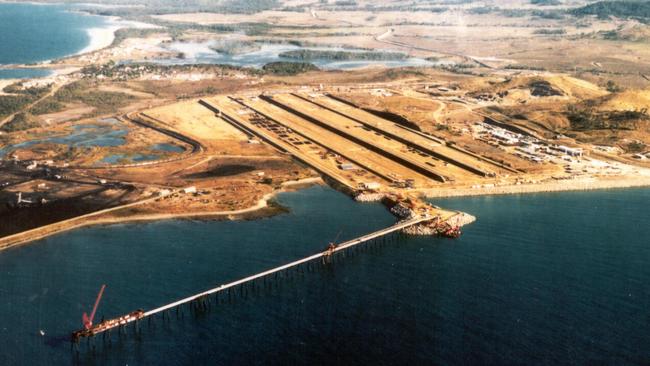New Dalrymple Bay Coal Terminal pricing methods, electricity deal revealed
Dalrymple Bay Coal Terminal’s expansion’s new pricing method has got the tick but not every user is happy with the structure. It comes as a greener future looms for the facility.
Business
Don't miss out on the headlines from Business. Followed categories will be added to My News.
The Dalrymple Bay Coal Terminal’s $1.276m 8X expansion will be funded through socialised pricing, despite some concerns from mining companies the new method could negatively impact users.
The four-phase expansion will increase the terminal’s system capacity by 14.9 million tonnes a year.
As part of a feasibility study, the Queensland Competition Authority reached out to existing terminal users to comment on the proposed pricing method.
BMC and Whitehaven Coal supported socialisation of the expansion, on the grounds it would operate in an “integrated way with the existing terminal component and provide significant benefits to existing users”, among other conditions.
The two mining companies reported the new pricing method would reduce handling charges, and offset any increase in existing users’ access charges from the expansion.

Among those to respond were AFII, Aurizon Network, BMC, DBIM, Synergies (on behalf of seven existing users – referred to as the non-expanding user group) and Whitehaven Coal.
The non-expanding user group did not support the change, arguing it would increase the cost and risk to existing DBCT users, and result in expanding users not bearing the true costs imposed by the expansion.
The group said that would potentially lead to distortions in other related markets, and create a risk a decision to expand may be made where the incremental benefits did not justify the incremental costs, leading to a loss of economic efficiency across the terminal and broader coal system.
The QCA final report stated the company considered the socialisation of the 8X expansion would “promote the economically efficient operation of, use of and investment in coal handling services at DBCT”.
“Socialising the cost and risk of the 8X expansion among all users of DBCT will mitigate the overall risks associated with expanding the terminal,” the report stated.
“Overall, we consider this to be an appropriate allocation of cost and risk, which will provide for the efficient investment in coal handling services at DBCT and the utilisation of an expanded terminal component.
“Socialisation of the 8X expansion allows DBIM to recover expected revenue that covers the efficient costs of providing access to the expanded terminal and share the volume risk, associated with terminal utilisation, among both new and existing users.
“(It also) reduces the costs and risks of expansion parties and access seekers obtaining access to coal handling services through the expanded terminal component
“(It) may increase the TIC for users of the existing terminal; however, we consider that the resulting increase will not have an impact on the use of coal handling services at DBCT by existing users, and the expansion will provide benefits to existing users.”
Dalrymple Bay Infrastructure Limited has also made moves to become more eco-friendly, with a new agreement signed to ensure 100 per cent renewable benefits from January 1, 2023.
DBIM signed a eight-year contract with CleanCo Queensland Limited to secure arrangements for 100 per cent of its electricity requirements with 100 per cent renewable benefits in the form of renewable electricity large-scale generation certificates.

DBI CEO Anthony Timbrell said a 2020 DBT Sustainability Strategy provided the framework for the company’s commitment to implement a “robust plan for the future sustainable operation of DBT”.
“This power purchase agreement is a major step toward DBI’s commitment to achieve net zero Scope 1 and Scope 2 emissions at DBT by 2050, with DBT’s scope 2 electricity emissions representing approximately 98 per cent of DBT’s greenhouse gas emissions each year,” Mr Timbrell said.
“We recognise that while the steel industry is carbon intensive, it has an important role to play in the transition to a low carbon economy.
“Through our efforts to minimise the energy intensity of DBT, we can actively contribute to the decarbonisation of the steel supply chain.”
CleanCo Chair Jacqui Walters said DBT’s electricity will come from sources including wind energy from MacIntyre Wind Farm, and solar energy from the Western Downs Green Power Solar Hub.
The projects will start in late 2022 and 2024 respectively.




